Library News
Explore a Database: Academic Search Complete
Posted on August 29th, 2018
This week we explore how to use the all-inclusive (multidisciplinary and informative Academic Search Complete, a database hosted by EBSCO.
Academic Search Complete is like every “choose your own adventure” book you read as a kid. With so many options for refining searches, from limiting to one journal for your search terms, to choosing a range of years of publication for articles on your topic, to even the type of document you’re looking for, like a book review or an editorial, Academic Search Complete gives you the choice to peruse at your leisure and find those sources that inform your research, no matter you’re writing!
Because Academic Search is a “choose your own adventure” style of database, we won’t be focusing on particular articles you can find. We’ll instead give you an overview of Academic Search Complete’s options and features, so you can get along choosing your own path and those documents unique to your assignment or thesis!
The homepage of Academic Search Complete might look a little intimidating with all of the menus and options, but never fear! The varied amount of documents gives it all its charm.

The top three search bars are like the ones we’re all used to, that being, they’re for entering keywords and phrases you might be looking for. The “Select a Field” option at the end of each search bar is to narrow down the keyword. Fields like author and titles can be found, but also, titles like reviews and products and geographical can be accessed!

Under the heading ‘Search Options’ is where Academic Search Complete gets more exciting. Under the subheading ‘Search Modes and Expanders,’ you can narrow what information you’d like Academic Search Complete to find for you by refining what search terms you’d like it to focus on. Ticking bullets on the left side of the subheading like ‘Find my entire search terms,’ will search for all the words you put into those top three search bars. And selecting boxes on the right side, like, ‘Apply related words’ and ‘Also search within full text of the articles,’ will further refine your search to give you the exact results you need, while also limiting the sources you usually have to sift through.
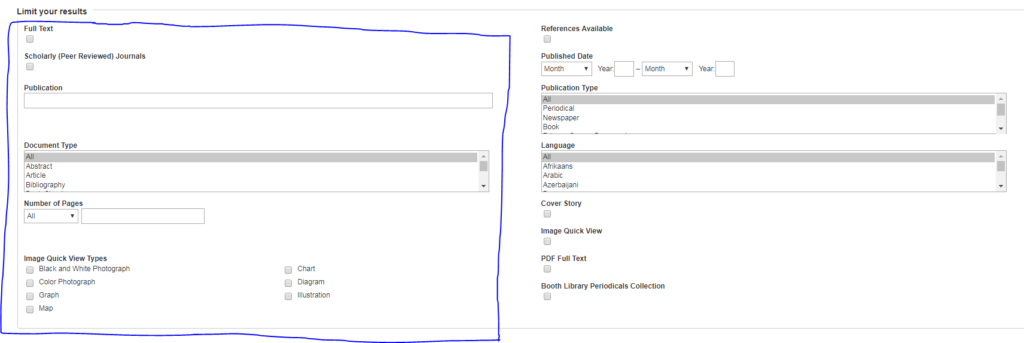
Under the next subheading, ‘Limit your results,’ you can search for the types of sources you might need. On the left side of the box you can limit results to only full-text documents or only scholarly journals. You can also search for a particular publication, like Psychology Today, for example.
Also on the left side are ways to limit what type of document you’re looking for. There are many different options in the scroll-down menu, things as basic as a report or an interview, to items such as literary criticisms to even product reviews and obituaries.
Likewise, you can search for the number of pages you want your results to be within. No one wants to read more than one 50 page articles. And with this feature you can limit the number of pages you want your results to be. Some types of images can also be found. Options for visuals like maps, photographs, charts and many more are found at the bottom of the left side.

But wait! There are also tons of options on the right side to further refine your searches and locate those hard-to-find, but perfect sources for that paper or presentation. At the top of the right side, you can search for sources only in a certain date range, and they type of publication you’re looking for. Items like health reports and newspaper (plus a whole lot more!) can be found in this scroll-down menu.
You can also search for the language in which you’d like your sources to be, or whether you want your sources to be a cover story, an image quick view, a full PDF file, or from Booth Library’s own extensive collection of periodicals!
The possibilities for narrowing your results are endless with Academic Search Complete, leaving you with the best sources and more time to spend on writing that paper! (Or catching up on Netflix, we won’t judge.)
See you back here at the Ref News Blog for more information on what our research librarians are up to, and also another Database of the Week!
Finding Books for Your Research at Booth
Posted on August 23rd, 2018
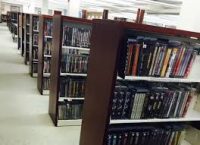 As a freshman (and a sophomore… and even as a senior!) the stacks at Booth are a little intimidating. Booth has over a million items in its collection, and with that sheer number of fiction, nonfiction, biography, poetry, law, statistics, encyclopedias, (and on and on) it can be hard to find items just for your major or for a Gen. Ed. class. But wait! There are research guides!
As a freshman (and a sophomore… and even as a senior!) the stacks at Booth are a little intimidating. Booth has over a million items in its collection, and with that sheer number of fiction, nonfiction, biography, poetry, law, statistics, encyclopedias, (and on and on) it can be hard to find items just for your major or for a Gen. Ed. class. But wait! There are research guides!
The research help librarians have made, (right under our undergraduate noses), some helpful guides to finding subjects, topics, course information, and even prolific authors. Each subject area even has its own librarian that can answer your questions or point you in the direction that you need to go for whatever it is you’re trying to find.
However, if you’re an independent go-getter who doesn’t need any human help (or just really nervous to ask a question) our research help librarians have already got you covered.
Many of our subject librarians have made Subject Guides that you can use to find call numbers or even books to get you started on everything from research papers to presentations to even thesis work! Here’s a quick how-to in finding your research guide:
- Start on the Booth Library homepage. (duh! This is where you start for everything at Booth)
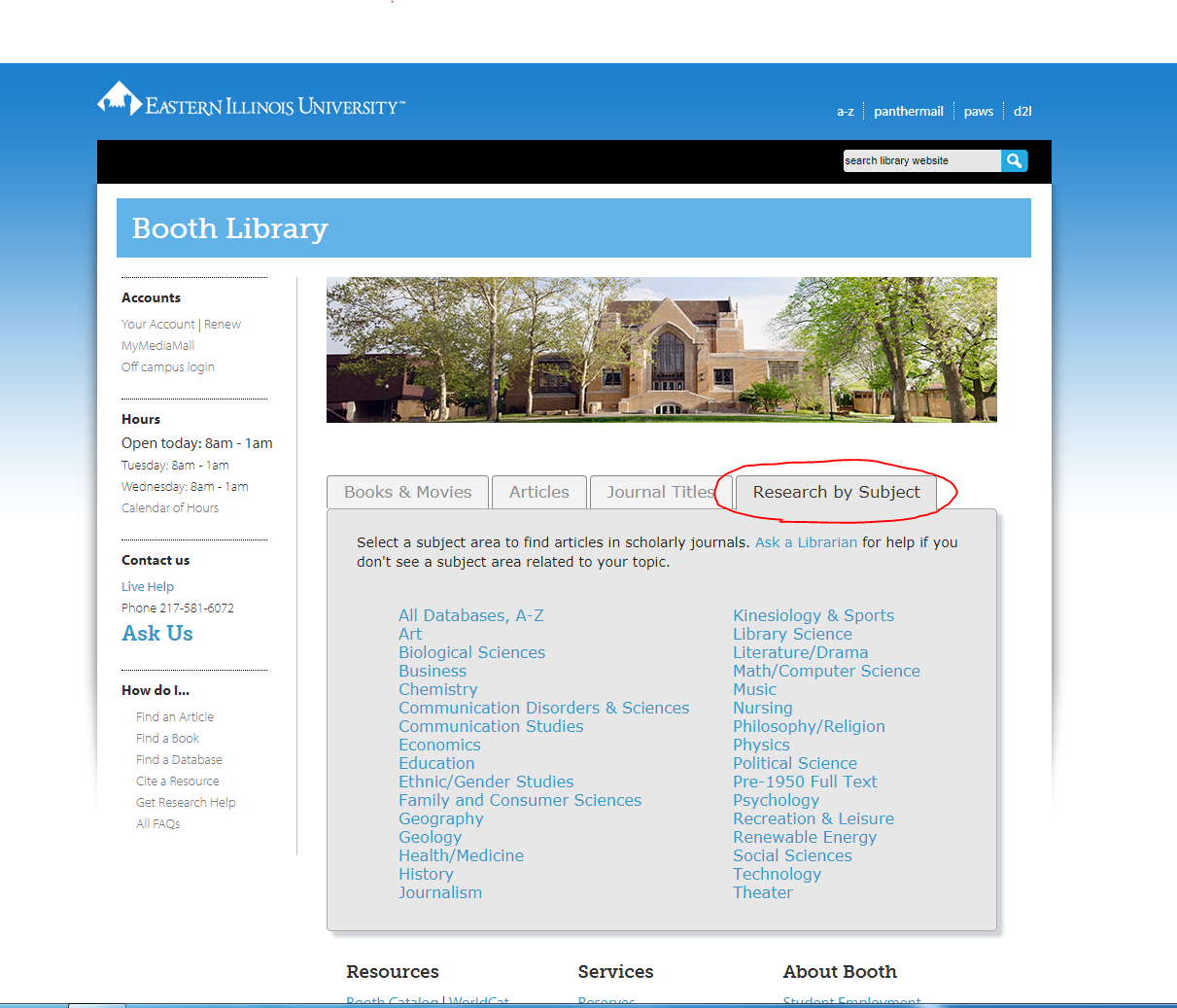
2. Select the last tab, ‘Research by Subject,’ above the search bar.
3. Pick your subject! Anything from art to theater, and everything in between!
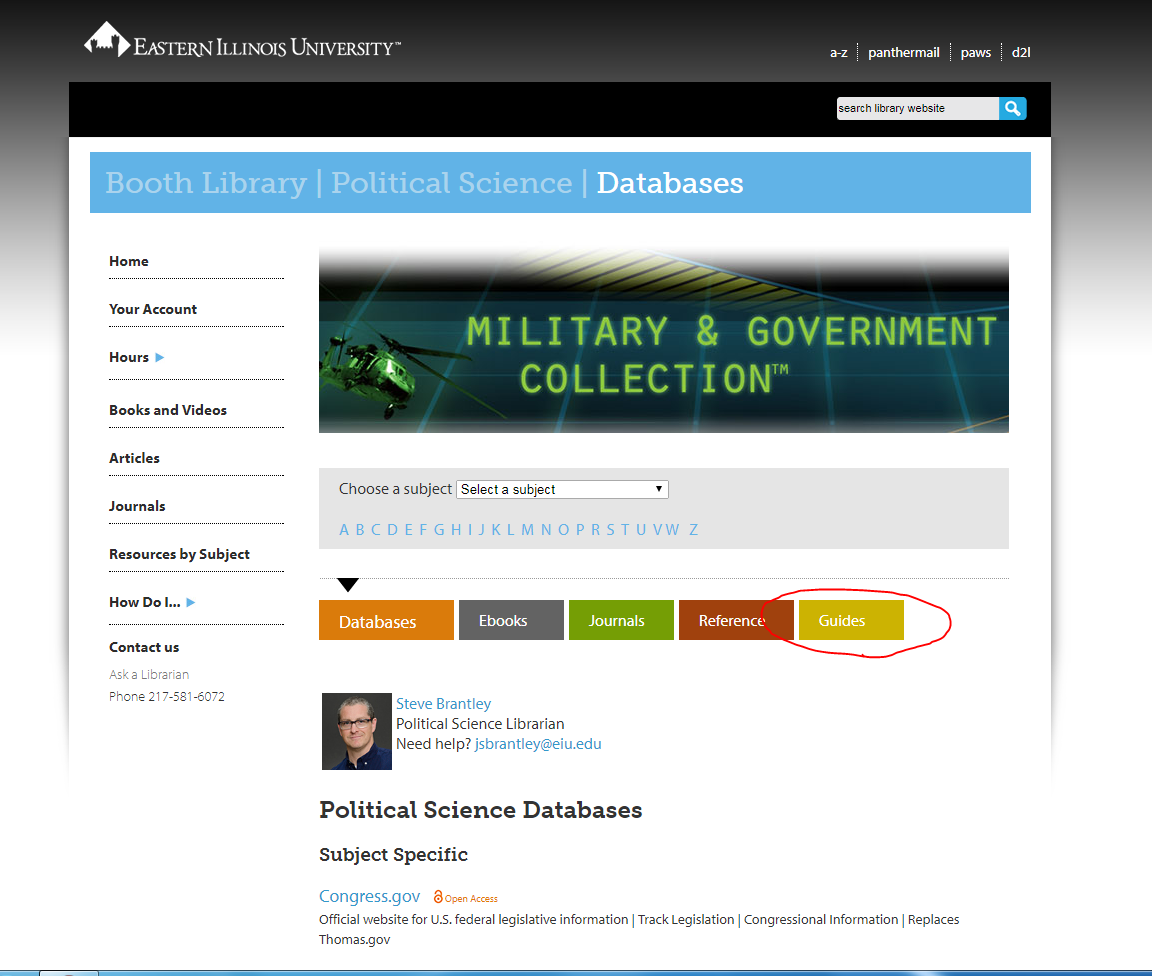
4. Once on your subject page, click the ‘Guides’ tab at the far right. (Psst! It’s also the only yellow tab on the page, in case that helps!)
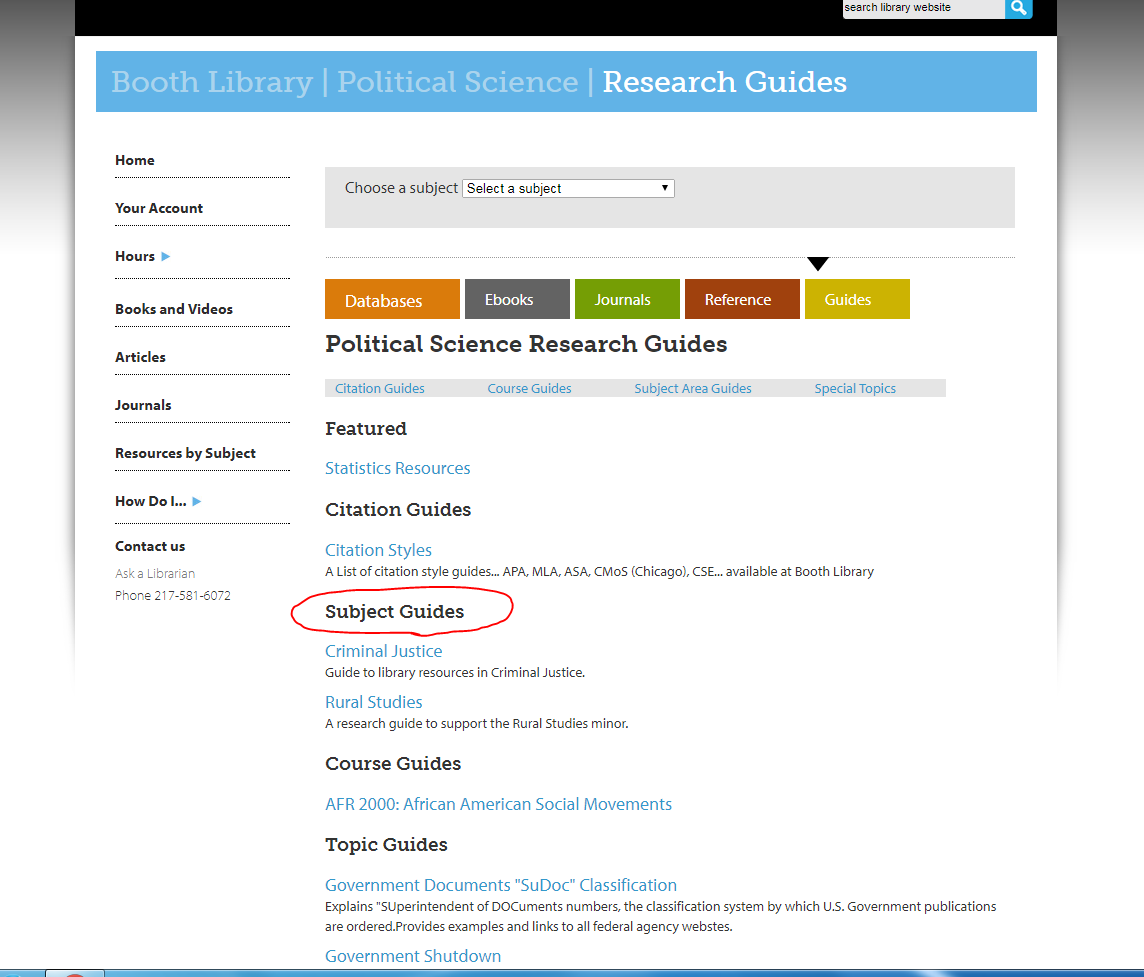
5. Once on the Guides page, there are several black headings: Citation Guides, Subject Guides, Course Guides, and Topic Guides. Citation Guides give you an overview of how to cite your work, Course Guides are for those lucky few whose professors made a research guide for a specific class, and Topic Guides vary from finding images to resources dealing with specific issues in that field of study. But we’re most interested in all the good stuff under ‘Subject Guides.’
6. Here’s where some research help librarians differ (depending on what items Booth has in its collection). Take, for example, political science. There are two different Subject Guides for poly sci: Rural Studies and Criminal Justice.
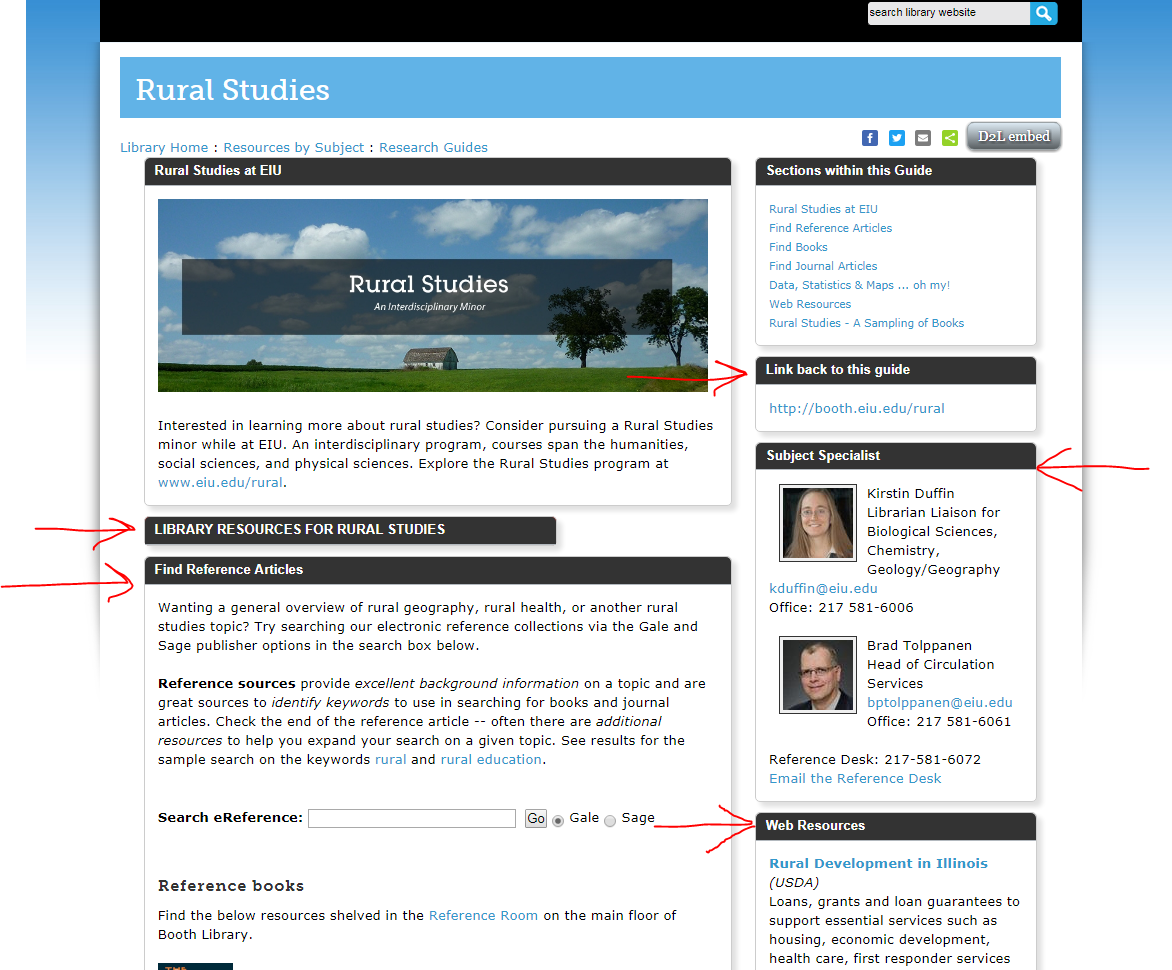
- Under the Rural Studies link, there are four black subheadings running down the middle of the page: Find Reference Articles, Find Books, Find Journal Articles, and Data, Statistics, and Maps… Oh My! Under Find Reference Articles you can find… you guessed it… reference books in Booth’s catalog related to Rural Studies. Under Find Journal Articles, you can find specific databases at Booth that relate to a specific topic. For example, if you wanted to look up information about environmental issues, you could click on the link right beside that heading, taking you to GreenFILE. Under Data, Statistics and Maps you can find general overviews of stats on a number of different questions regarding Rural Studies from agencies like the Census Bureau and the USDA.
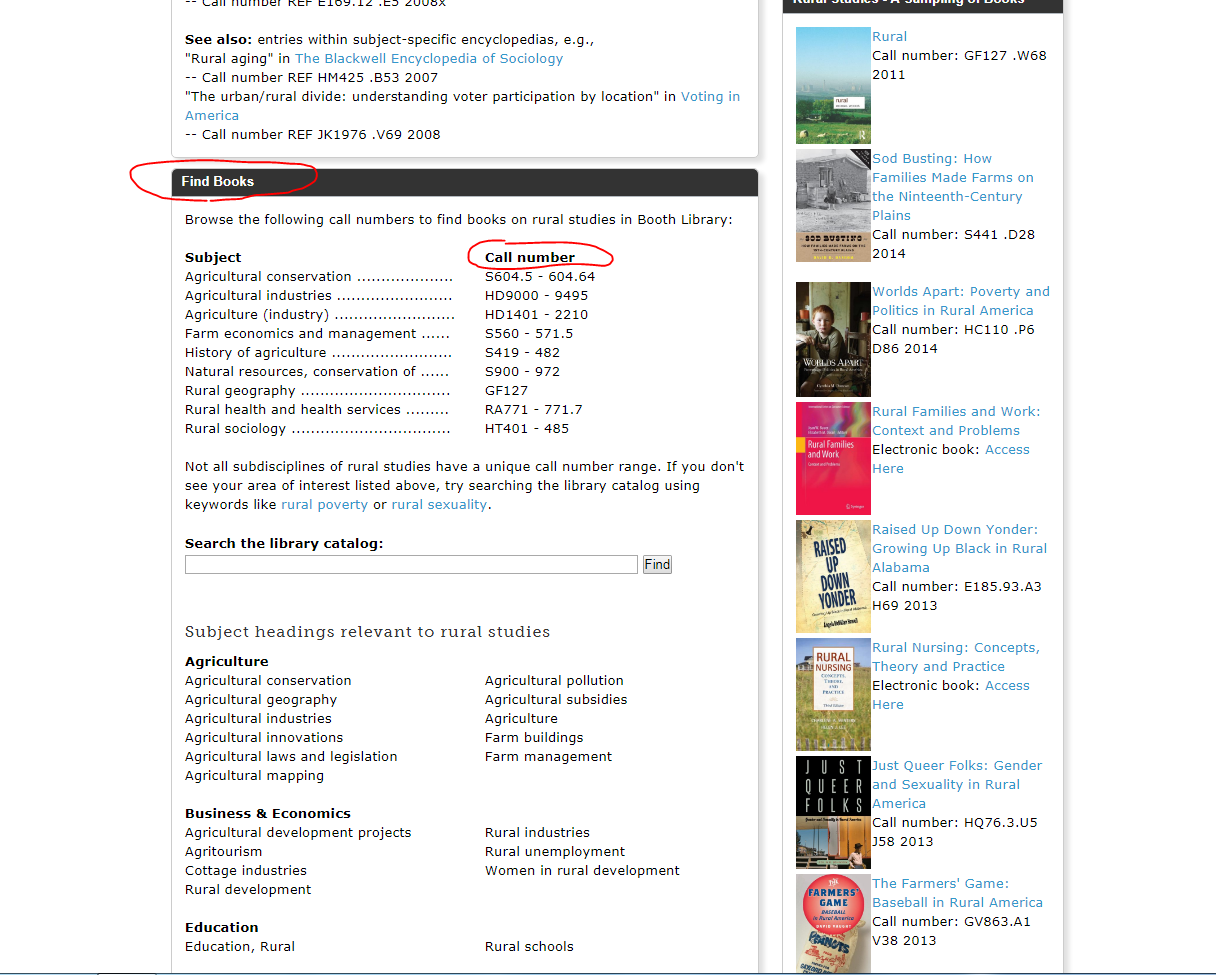
But what we’re really interested in, is what can be found under Find Books, and that’s call numbers for certain subjects! Call numbers for issues such as Rural Sociology and the History of Agriculture can been found under this heading, and then found in the stacks around Booth. So there’s no more wandering aimlessly through the winding stacks for that book you might need!
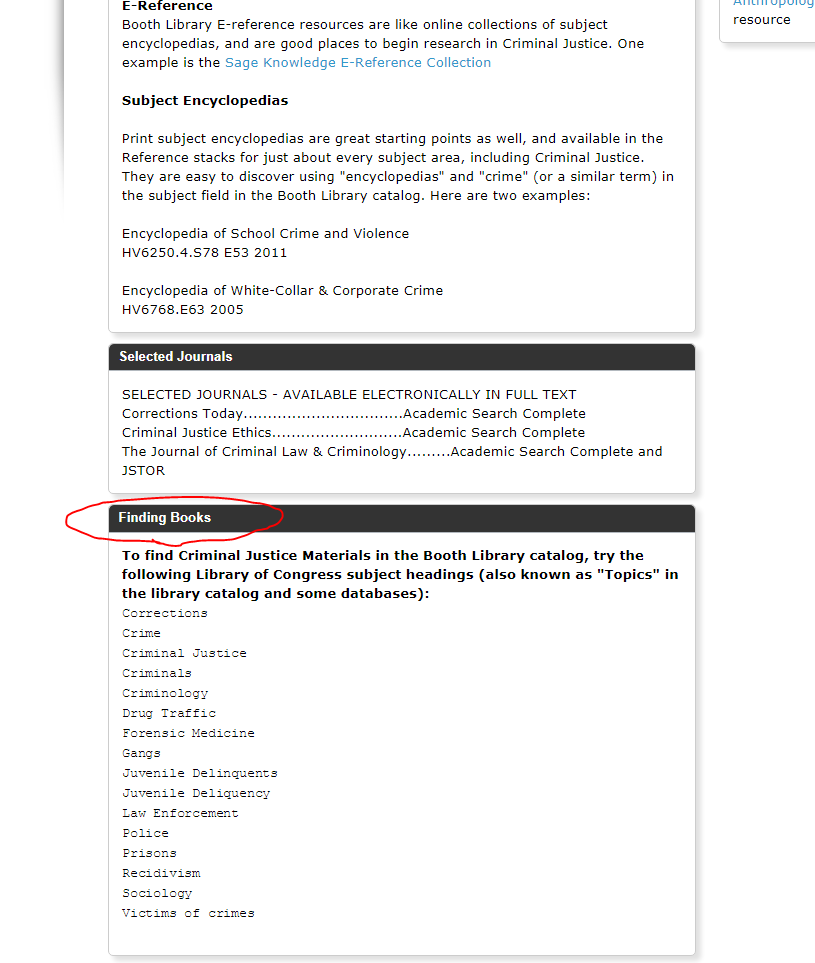
- Likewise, under the Criminal Justice link, you can find specific call numbers for encyclopedias dealing with crime under ‘E-Reference and Subject Encyclopedias.’ You can also find specific journal titles Booth’s subscribes to under ‘Selected Journals.’ Unlike many of the Subject Guides for different majors and minors, the Criminal Justice discipline covers a lot of different subjects regarding criminal justice, and because of all that info, it doesn’t provide specific call numbers for subjects. But never fear! In case you’re stuck on what topics you’d like to feature, the Criminal Justice Subject Guide provides specific topics, like ‘gangs’ and ‘police’ under Finding Books, which you can search in Booth’s catalog at your leisure!
Of course, not all majors and minors have the same headings. So here would be where a little bit of (gasp!) reading comes into play to skim the Subject Guides and find call numbers or Topics you can search in Booth’s catalog. But a good rule of thumb is you can usually find call numbers under the headers ‘Find Books,’ ‘Browsing the Stacks…,’ ‘Search for Books,’ or even under ‘Overview’ for those lucky few. And here’s another tip! You can easily find any discipline’s own subject librarian from Booth’s homepage for any questions you have! The link to look up the name, email and of course subject for each librarian can be found under the ‘About Booth’ heading, and then under the Subject Librarians link. Just look under the search bar and to the right!
Whew! We know this is a lot of information, but now you’re not only equipped with the knowledge of how to figure out that sometimes tricky Library of Congress system, but also how to ask for help if you’re still struggling!
Back to School Movies
Posted on August 20th, 2018
Listed below is a finely curated selection of films to help usher in the new semester. Inspiring true stories, musicals, outrageous ’80s comedy — there’s something here for everyone. Revisit an old classic, discover a new favorite, or just watch “Mean Girls” again for the 27th time. We won’t blame you. Welcome back, Panthers!
Library tours offered
Posted on August 13th, 2018
Eastern students, faculty and staff members are encouraged to take a tour of Booth Library and find out what the library has to offer.
Twenty-minute tours will be offered regularly during the first four weeks of the semester. There’s no need to sign up; just come to the Research Help desk on the north end of the library to join in any of the tours Monday through Thursday. Tours will be offered at 10 a.m. and 1 p.m. through Sept. 13. The library will be closed on Sept. 2-3 in observance of the Labor Day holiday.
Tours are also offered by appointment. Contact a reference librarian at 581-6072 to schedule a tour.
Newell is new dean of library services
Posted on August 3rd, 2018

Zachary Newell began his duties as dean of library services at Booth Library on Aug. 1. Newell comes to Eastern from Salem State University in Massachusetts, where he served in various library roles during the past 10 years.
Newell said he is excited to be joining such a talented team in Booth Library. He is especially impressed with the excitement and passion Eastern’s faculty and staff share in working closely and collaboratively with the university’s diverse population of students.
To help shape the future of Booth Library, Newell plans to continue examining and reimagining the relationship between the campus community and the library’s existing on-campus spaces, while cultivating additional opportunities for cross-disciplinary collaboration.
As part of an ongoing interest in internationalization and student success, Newell also indicated his interest in working closely with his new Eastern colleagues to advance the library as a community and regional hub for transformative, lifelong learning.
Newell earned a bachelor’s degree in philosophy, and master’s degrees in art history and library science. He is working to complete a doctoral dissertation focused on creativity and information literacy. Newell was selected as a Fulbright Scholar, allowing him to serve at the Bibliotheca Alexandria in Alexandria, Egypt, during the region’s recent Arab Spring movement.
Newell resides in Charleston with his wife and two children.
Electronic reserves now accessible in D2L
Posted on August 1st, 2018
Faculty: The Booth Library electronic reserves service migrated to D2L this summer. E-reserves is now exclusively provided through D2L.
The benefits of using D2L for e-reserves include:
- easy access for students (no extra password to remember!), and
- easy set-up for you.
How does it work?
- Activate your course in D2L. (Contact the Faculty Development and Innovation Center for instructions on activating your course.)
- To migrate content: If you have materials in the library e-reserves system that you would like migrated into D2L, add Stacey Knight-Davis (NetID: slknight) in the role of Librarian (similar to the Grad Assistant role) to your D2L course. Email Stacey to let her know what content to migrate.
- To add new content: Add Tina Jenkins (NetID: cfjenkins) in the role of Librarian to your D2L course. Send your list of new reserves materials to boothrsv@eiu.edu or via http://library.eiu.edu/reserves/ereserverequest.php.
More information about the library reserves service is available at http://library.eiu.edu/reserves/reserves_instructions.html.
Course instructors needing assistance with posting content in D2L should contact the instructional support specialist assigned to their college.



